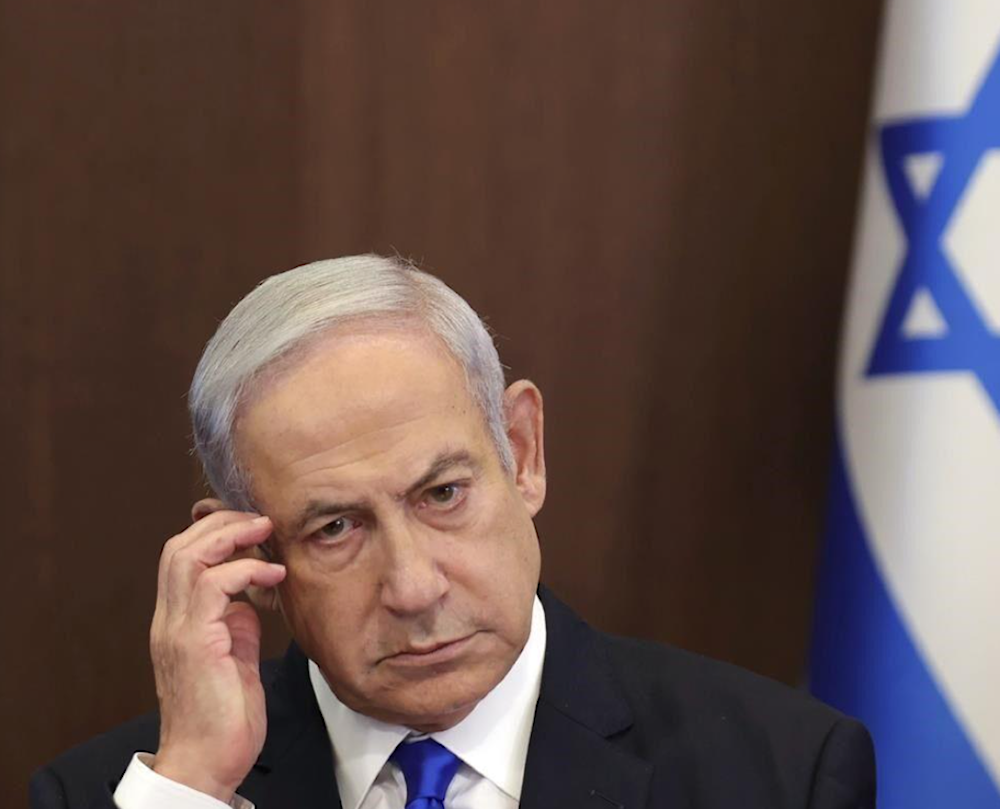'Israel' attempts to expand influence in Central Asia: Reports
As the war in Gaza rages from numerous fronts like Lebanon, Yemen, and Iran, both 'Israel' and Iran are also extending their reach into Ukraine, the Caucasus, and Central Asia.
-

Israeli Prime Minister Benjamin Netanyahu attends the weekly cabinet meeting in the prime minister’s office in occupied al-Quds in 2023 (AP)
The Caucasus and Central Asia have become key battlegrounds in a new Cold War, with "Israel" attempting to overpower Iran's influence. According to National Interest, the conflict is part of a larger struggle between the Western bloc led by the US and the Eurasian bloc led by China, Russia, and Iran.
As the war in Gaza rages with numerous fronts like Lebanon, Yemen, and Iran involved, both 'Israel' and Iran are also extending their reach into the Caucasus, and Central Asia. Iran has strengthened its alliance with Azerbaijan and expanded its ties with Central Asian nations, while 'Israel' is enhancing its relationships with Armenia and reinforcing its position in Central Asia.
Central Asian states rely on Iran’s Bandar Abbas port on the Persian Gulf to get much of their fossil fuels to market.
In addition, Turkey, as a geopolitical pivot, navigates between Western and Eurasian influences.
While Turkish President Recep Tayyip Erdoğan has supported Ukraine’s NATO membership and Sweden’s accession, Turkey's stance on "Israel" has aligned more closely with Iran and Russia since October 7, hosting Hamas leaders, suggesting taking military action and halting trade with the occupation.
Historically, Russia has held sway over the Caucasus and Central Asia, viewing these regions as part of its sphere of influence even after the Soviet Union's collapse.
However, recent shifts are evident: Georgia is improving ties with Europe and China, Armenia is deepening its relationship with Iran, and Azerbaijan is aligning more closely with Turkey. Iran is also working on infrastructure projects linking it to Georgia’s Black Sea ports, and both Armenia and Georgia are strengthening ties with Saudi Arabia.
In response to this changing dynamic, 'Israel' has sought to increase its presence in these regions, taking advantage of the weakened Russian influence. At the same time, Iran’s strong economic position remains a significant player in the region.
Middle East crisis caused by US desire for regional dominance: Russia
According to Russian Foreign Ministry spokesperson Maria Zakharova, the current situation and rising tensions in the Middle East stem from the United States' desire to maintain its dominant regional influence.
"In many ways, the current dramatic situation has become a consequence of the desire of the United States to maintain its dominant influence in the Middle East," Zakharova said.
The diplomat criticized Washington's desire to "monopolize the mediation role" amid "Israel's" ongoing genocide in Gaza, highlighting its concern about preserving the status quo and promoting "economic peace" in the region. Meanwhile, the US is neglecting a long-term, permanent ceasefire based on decisions from the UN General Assembly and the UN Security Council, further contributing to the rising tensions.
Zakharova emphasized that the increase of US military personnel in the Middle East could lead to further escalation in the region, with Russia urging against actions that could worsen the situation.

 3 Min Read
3 Min Read








